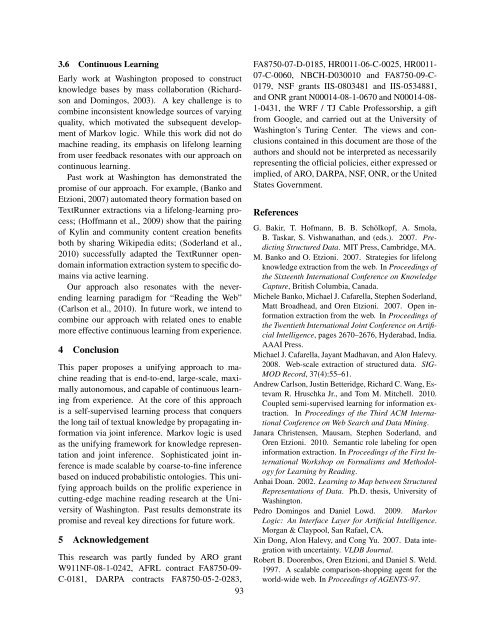W10-09
W10-09
W10-09
Create successful ePaper yourself
Turn your PDF publications into a flip-book with our unique Google optimized e-Paper software.
3.6 Continuous Learning<br />
Early work at Washington proposed to construct<br />
knowledge bases by mass collaboration (Richardson<br />
and Domingos, 2003). A key challenge is to<br />
combine inconsistent knowledge sources of varying<br />
quality, which motivated the subsequent development<br />
of Markov logic. While this work did not do<br />
machine reading, its emphasis on lifelong learning<br />
from user feedback resonates with our approach on<br />
continuous learning.<br />
Past work at Washington has demonstrated the<br />
promise of our approach. For example, (Banko and<br />
Etzioni, 2007) automated theory formation based on<br />
TextRunner extractions via a lifelong-learning process;<br />
(Hoffmann et al., 20<strong>09</strong>) show that the pairing<br />
of Kylin and community content creation benefits<br />
both by sharing Wikipedia edits; (Soderland et al.,<br />
2010) successfully adapted the TextRunner opendomain<br />
information extraction system to specific domains<br />
via active learning.<br />
Our approach also resonates with the neverending<br />
learning paradigm for “Reading the Web”<br />
(Carlson et al., 2010). In future work, we intend to<br />
combine our approach with related ones to enable<br />
more effective continuous learning from experience.<br />
4 Conclusion<br />
This paper proposes a unifying approach to machine<br />
reading that is end-to-end, large-scale, maximally<br />
autonomous, and capable of continuous learning<br />
from experience. At the core of this approach<br />
is a self-supervised learning process that conquers<br />
the long tail of textual knowledge by propagating information<br />
via joint inference. Markov logic is used<br />
as the unifying framework for knowledge representation<br />
and joint inference. Sophisticated joint inference<br />
is made scalable by coarse-to-fine inference<br />
based on induced probabilistic ontologies. This unifying<br />
approach builds on the prolific experience in<br />
cutting-edge machine reading research at the University<br />
of Washington. Past results demonstrate its<br />
promise and reveal key directions for future work.<br />
5 Acknowledgement<br />
This research was partly funded by ARO grant<br />
W911NF-08-1-0242, AFRL contract FA8750-<strong>09</strong>-<br />
C-0181, DARPA contracts FA8750-05-2-0283,<br />
93<br />
FA8750-07-D-0185, HR0011-06-C-0025, HR0011-<br />
07-C-0060, NBCH-D030010 and FA8750-<strong>09</strong>-C-<br />
0179, NSF grants IIS-0803481 and IIS-0534881,<br />
and ONR grant N00014-08-1-0670 and N00014-08-<br />
1-0431, the WRF / TJ Cable Professorship, a gift<br />
from Google, and carried out at the University of<br />
Washington’s Turing Center. The views and conclusions<br />
contained in this document are those of the<br />
authors and should not be interpreted as necessarily<br />
representing the official policies, either expressed or<br />
implied, of ARO, DARPA, NSF, ONR, or the United<br />
States Government.<br />
References<br />
G. Bakir, T. Hofmann, B. B. Schölkopf, A. Smola,<br />
B. Taskar, S. Vishwanathan, and (eds.). 2007. Predicting<br />
Structured Data. MIT Press, Cambridge, MA.<br />
M. Banko and O. Etzioni. 2007. Strategies for lifelong<br />
knowledge extraction from the web. In Proceedings of<br />
the Sixteenth International Conference on Knowledge<br />
Capture, British Columbia, Canada.<br />
Michele Banko, Michael J. Cafarella, Stephen Soderland,<br />
Matt Broadhead, and Oren Etzioni. 2007. Open information<br />
extraction from the web. In Proceedings of<br />
the Twentieth International Joint Conference on Artificial<br />
Intelligence, pages 2670–2676, Hyderabad, India.<br />
AAAI Press.<br />
Michael J. Cafarella, Jayant Madhavan, and Alon Halevy.<br />
2008. Web-scale extraction of structured data. SIG-<br />
MOD Record, 37(4):55–61.<br />
Andrew Carlson, Justin Betteridge, Richard C. Wang, Estevam<br />
R. Hruschka Jr., and Tom M. Mitchell. 2010.<br />
Coupled semi-supervised learning for information extraction.<br />
In Proceedings of the Third ACM International<br />
Conference on Web Search and Data Mining.<br />
Janara Christensen, Mausam, Stephen Soderland, and<br />
Oren Etzioni. 2010. Semantic role labeling for open<br />
information extraction. In Proceedings of the First International<br />
Workshop on Formalisms and Methodology<br />
for Learning by Reading.<br />
Anhai Doan. 2002. Learning to Map between Structured<br />
Representations of Data. Ph.D. thesis, University of<br />
Washington.<br />
Pedro Domingos and Daniel Lowd. 20<strong>09</strong>. Markov<br />
Logic: An Interface Layer for Artificial Intelligence.<br />
Morgan & Claypool, San Rafael, CA.<br />
Xin Dong, Alon Halevy, and Cong Yu. 2007. Data integration<br />
with uncertainty. VLDB Journal.<br />
Robert B. Doorenbos, Oren Etzioni, and Daniel S. Weld.<br />
1997. A scalable comparison-shopping agent for the<br />
world-wide web. In Proceedings of AGENTS-97.


